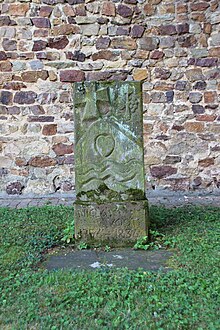Nicolaus Vogt

Nicolaus (Niklas) Vogt (born December 6, 1756 in Mainz ; † May 19, 1836 in Frankfurt am Main ) was a historian , conservative state theorist and politician in the service of Kurmainz , the Grand Duchy of Frankfurt and the Free City of Frankfurt .
Life
Vogt attended the Jesuit high school in Mainz . He was also shaped by the social interaction in his parents' house and by his brother, the philosophy professor Heinrich Vogt. Vogt showed musical, literary and artistic talents, but was mainly interested in regional history. Since 1774 he studied at the Mainz University therefore philology and history .
After completing his studies, Vogt received a professorship. His lectures with Klemens Wenzel Lothar von Metternich made a great and lasting impression, especially the idea of interstate balance . In 1790 he was severely mistreated by angry journeymen during the Mainz knot uprising when he tried to calm down the insurgents who had penetrated the university building.
When Mainz was occupied by French troops for the first time in 1792 , Vogt fled the city. He went first to Strasbourg and from there to Switzerland . After the French withdrew, Vogt returned to Mainz and resumed teaching. After the second occupation of the city in 1797, he went to Aschaffenburg with the electoral government . Since parts of the university had also followed the court, he resumed teaching there. In addition, Vogt became head of the school system in the government and was also electoral librarian. Together with Prince-Bishop Karl Theodor von Dalberg , Vogt traveled to Paris in 1804 in the rank of secret legation councilor for Napoleon's imperial coronation .
After the founding of the Grand Duchy of Frankfurt, Dalberg gave Vogt the position of curator for the school system. Vogt later joined the Ministry of Foreign Affairs. In 1808, Vogt was involved in founding the museum society in Frankfurt, based on the French model . After the Free City of Frankfurt was formed, Vogt was a senator and lay judge.
plant

Between 1785 and 1792 von Vogt appeared in five parts “About the European Republic.” The work later appeared under the title “Historical representation of the European League of Nations.” In 1792 Vogt published an outline of the history of the city of Mainz . Following on from his first major work, in 1802 he wrote the two-volume work “System of Balance and Justice.” In Mainz he also wrote the “History of the French Revolution of 1355 as a warning for aristocrats and democrats”. During his time in Frankfurt he continued the state relations that had already begun. Even if largely forgotten, Vogt also took part in the discussion about the future state structure of Germany with these and other writings.
Between 1817 and 1836 Vogt's "Rhenish Stories and Legends" appeared in four volumes.
After his death, State Chancellor Metternich donated a tombstone to his teacher with the inscription: "His grateful friend and student CWL Prince von Metternich dedicated this tombstone to the loyal advocate of the old law, the zealous promoter of local history." In the cemetery of Johannisberg Castle (Rheingau ) .
Fonts
- Gustav Adolph King in Sweden , 1790
- Outline of a history of Mainz , 1792
- Political pamphlets , 1803
- The ruins on the Rhine , Frankfurt a. M. 1809.
- Niklas Vogt's historical testament , Mainz 1814 Online
literature
- Karl Georg Bockenheimer : Nicolaus Vogt . In: Allgemeine Deutsche Biographie (ADB). Volume 40, Duncker & Humblot, Leipzig 1896, pp. 189-191.
- Joseph Kehrein : Biographischliterarisches Lexikon der Catholic German Dichter , Volume 1, 1868, page 222; Digital scan of the source
- Helmut Mathy : Niklas Vogt and its political significance. In: Mainz. Quarterly issues for culture, politics, economics, history . Issue 4, 6th year 1986. Verlag H. Schmidt Mainz, pp. 113-118, ISSN 0720-5945
Individual evidence
- ^ City and bourgeoisie in Frankfurt am Main, p.185
- ^ The old empire in German history, p.460
- ↑ Rhenish stories and legends (digitized version)
- ↑ Klemens Wenzel von Metternich : Mémoires , Volume 1 1773-1815. , Paris, 1880
Web links
| personal data | |
|---|---|
| SURNAME | Vogt, Nicolaus |
| ALTERNATIVE NAMES | Vogt, Niklas |
| BRIEF DESCRIPTION | Historians, politicians and state thinkers |
| DATE OF BIRTH | December 6, 1756 |
| PLACE OF BIRTH | Mainz |
| DATE OF DEATH | May 19, 1836 |
| Place of death | Frankfurt am Main |